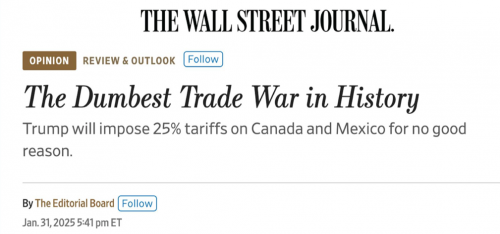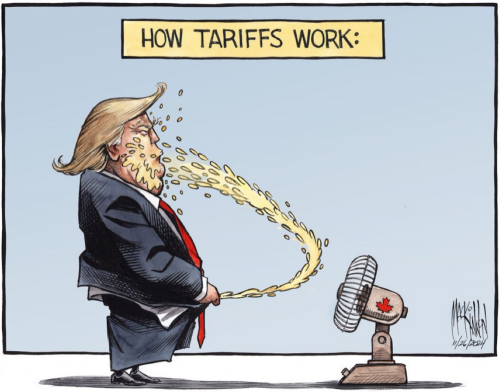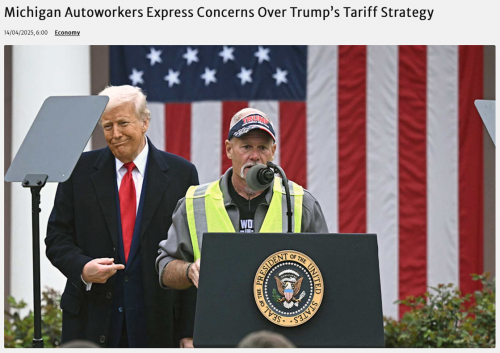(JohnWilly @ May 8, 2025)
100 days after Donald Trump took office, he received negative comments elsewhere, especially the announcement of tariffs on goods from many countries, which led to global stock market fluctuations and soaring prices, and finally it caused the United States economy to fall into recession.

Trump's tariff policy has been criticized as "the dumbest tariff war in history". Since April, it has not only triggered counterattacks from allies, leading to the division of the global trade system, even the International Monetary Fund (IMF) has lowered its global growth forecast, and the US economy has been hit the hardest.
Since Trump also proposed "taking back the Panama Canal" and "renaming the Gulf of Mexico" after taking office, many criticized it as "imperialist expansion", which undermined multilateral mechanisms and international rules. Even European allies have lost trust in US and turned to seek a more independent diplomatic strategy.

Large-scale demonstrations have occurred everywhere in US recently, millions of angry people have taken to the streets to express various protests, with more than 1,300 marches in a single day. According to several mainstream polls in US, Trump's approval rating in the first 100 days of his presidency was only 39%, a record low in 80 years; approval of economic policies fell to 36%, and 63% of the people opposed tariff measures.
According to US media reports, the following 9 examples illustrate the various experiences of importers and exporters and ordinary workers in different regions of the United States during Trump's first 100 days in office:
1. Georgia American importer She Prints It, LLC is a small and micro enterprise located in Henry Country, Georgia. Its main business includes printed products, custom designs and creative peripherals. Almost all of the company's products are imported from China. Its founder and owner Cher'don Reynolds once said that the company is currently in a roller coaster period of tariffs. She publicly expressed dissatisfaction with legislators on the issue of increasing tariffs, believing that the relevant legislation ignores their interests.
2. Pennsylvania port workers: The Port of Philadelphia imported $4.5 billion worth of goods from China in 2024, but only exported $400 million to China. There are about 12,000 port workers in the Port of Philadelphia, many of whom are unionized.

3. Michigan auto workers: Flint is a city in central Michigan with 80,000 blue-collar workers. GM's Flint assembly plant is responsible for producing the best-selling Chevrolet pickup trucks in the United States. It has about 5,000 grassroots workers, most of whom are members of the UAW Local 598. Although the UAW president supports Trump's tariffs, according to Chad Fabbro, the treasurer of the UAW, many union workers in the Flint plant think that tariffs are "bullshit."
4. North Carolina American exporters: International trade is an important economic pillar of North Carolina, and exports to Canada, China, and Mexico account for 45% of NC's exports. NC's agriculture is heavily dependent on exports, and about 26% of agricultural products are exported to international markets, including pork and chicken.
5. Iowa American exporters: Iowa is the second largest soybean producing state in US in 2024, with a production of about 15.6 tons. The state supported Trump in the 2024 election, but Senator Grasley participated in launching the Trade Review Act, which aims to limit the power to implement presidential tariffs and give Congress greater trade supervision power.
6. Florida American importers: Starting from March 12, Emily Ley, a registered Democrat and a self-employed business owner in Florida, posted on Instagram many times to criticize Trump's tariffs on China, which would cause heavy damage to Simplified, her company. This series of posts received tens of thousands of likes and comments. Subsequently, the New Civil Liberties Alliance (NCLA), a conservative legal organization in Florida, took the initiative to contact Ley and filed a lawsuit against the Trump administration on behalf of Ley in the Northern District Court of Florida on April 2, questioning Trump's lack of power to unilaterally impose tariffs and infringing on Congress' power to set tariffs. This is the first case in US to sue Trump over tariffs.

7. California American exporters: Almonds are California's most valuable export. California provides more than 80% of the world's almonds, and more than 70% of US almond exports to China. After China imposed punitive tariffs on US exports to China, almond prices increased by at least one-fold, and Chinese importers turned to Australian almond traders.
8. Maryland port workers: The Port of Baltimore in Maryland is one of the largest ports in US, providing more than 150,000 jobs and is an important economic growth engine for Maryland. Among them, cars and light trucks are the main cargoes handled by the Port of Baltimore. Trump's 25% tariff on cars and auto parts will have a huge impact on the port. Maryland Governor Wes Moore said that the tariffs may cause an impact of more than $2 billion.
9. US importers in Washington, DC: The key active ingredient of the anticoagulant heparin is mainly extracted from the small intestinal mucosa of pigs. Thanks to China's mature pig industry, China occupies a major position in the global heparin raw material market. According to the American Society of Hematology, about 12 million hospitalized patients in US need heparin each year.
Overall, the mainstream media in US The Washington Post, criticized Trump's 100-day administration as an "epic failure". Some of his policies are to fulfill campaign promises, but at the expense of constitutional stability, economic balance and international credibility, thus exacerbating chaos and uncertainty at home and abroad. For example, White House frequently replaces officials, and the director of the Internal Revenue Service has changed four times, resulting in frequent leaks and a lack of consistency in policies. In addition, as the head of the "Government Efficiency Department", Elon Musk has used radical means to cut budgets, such as closing the International Development Agency, which has caused federal agencies to stagnate, further intensified social contradictions and caused great public dissatisfaction. The US federal court has made unconstitutional rulings on more than 100 government policies, especially those involving immigrant deportation and budget cuts, the Judge even used "shocking" to describe the White House's approach. Trump has promoted policies through a large number of executive orders, trying to "eradicate the deep government", which will inevitably lead to problems of governance stability.